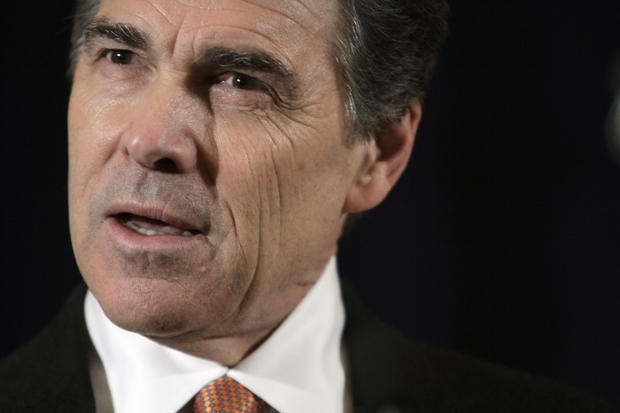Perry pledges support for Israel if he wins the White House
Republican presidential candidate Rick Perry on Tuesday called President Obama's Middle East policy "naïve, arrogant, misguided and dangerous," and said that as president, he would reaffirm U.S. allegiance to Israel and withhold billions of dollars in aid to Palestine if it continues to seek United Nations recognition as an independent state.
Perry was in New York City, home of the U.N., during its annual General Assembly meeting on the same day that Obama was speaking there, hoping to contrast his views with those of Obama, who has been sometimes critical of Israel. Perry has also been actively courting Jewish voters in the wake of Republican Bob Turner's upset victory last week in a heavily Jewish congressional district in Brooklyn and Queens.
"There is no middle ground between our allies and those who seek their destruction," Perry said, surrounded by representatives from Jewish advocacy groups. "America should not be ambivalent between the terrorist tactics of Hamas and the security tactics of the legitimate and free state of Israel. By proposing 'indirect talks' through the U.S. rather than between Palestinian leaders and Israel, this administration encouraged the Palestinians to shun direct talks."
By suggesting that the 1967 borders between the two countries be a starting point for Israeli-Palestinian talks, Obama "has put Israel in a position of weakness and taken away their flexibility to offer concessions as part of the negotiation process," the Texas governor said to a crowd of about 80 people, mostly journalists, in a ballroom at the W Union Square Hotel. He was flanked by more than dozen influential members of the New York Jewish community, including Assemblyman Dov Hinkind and Rabbi Tzvi Weinreb. Also there were two Knesset members, Nissim Zeev, founder of the powerful Sephardic Shas Party, and Danny Danon, the deputy Knesset speaker.
Perry laid out three conditions that as president he would impose on the Palestinians: He would insist that Palestinian leaders publicly affirm Israel's right to exist as a Jewish state, that they persuade Hamas to renounce acts of terrorism and release kidnapped Israeli Gilad Shalit, and that Palestinian statehood be discussed only through direct negotiations between the two countries.
Perry also touched on the sensitive issue of Iran's nuclear buildup, challenging Obama as insufficiently tough on another of Israel's enemies. "Economic sanctions must be tightened and increased and all options must remain on the table to stop a brutally repressive regime from acquiring a nuclear capability," Perry said. Although he did not call for U.S. military action against Iran, he noted that Israel "took out" nuclear facilities in Iraq in 1981 and in Syria in 2007 by bombing them.
"Israel's security is critical to America's security," Perry said.
If the Palestinians continue their "gambit" of seeking U.N. recognition for statehood, the United States should "reconsider the $4 billion in assistance we have provided to the Palestinians over the last 17 years," Perry said, and should close the PLO office in Washington if the U.N. grants the standing of a Palestinian state.
In meeting with reporters after his remarks, Perry said, "Israel is our oldest and most stable democratic ally in that region, and that is what this is about. I also, as a Christian, have a clear directive to support Israel. From my perspective, it's pretty easy, both as an American and as a Christian.
"... I hope you will tell the people of Israel that help is on the way."
